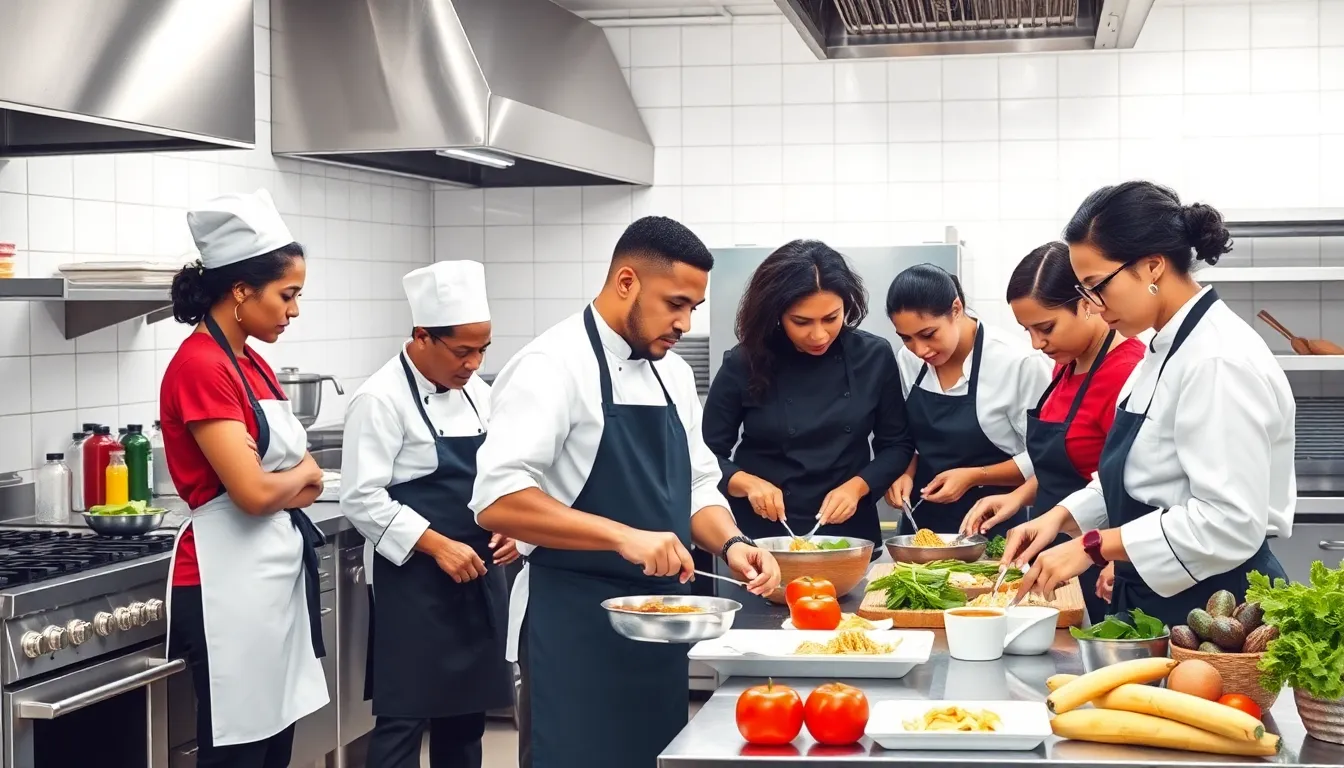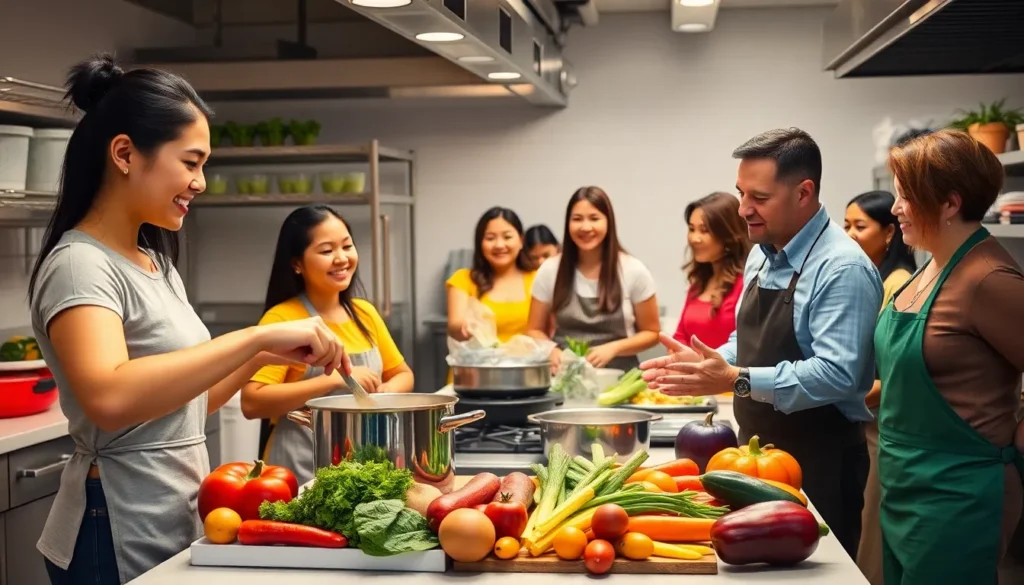Table of Contents
ToggleImagine a kitchen where delicious meals are crafted not just for taste but for a cause. Welcome to the world of “Kitchens for Good,” where culinary creativity meets social impact. This innovative concept doesn’t just whip up mouthwatering dishes; it also serves up opportunities for those in need, transforming lives one meal at a time.
Overview of Kitchens For Good
Kitchens for Good represents an innovative initiative merging culinary arts with meaningful social reform. This program focuses on serving nutritious meals while empowering individuals facing challenges.
Mission and Vision
Kitchens for Good aims to tackle food insecurity, unemployment, and poverty. Its mission revolves around creating a sustainable model that nurtures individuals’ skills and provides them with job opportunities. Visionaries behind the initiative believe that transforming lives through the culinary profession benefits both participants and the community as a whole. Rather than just feeding people, the program seeks to elevate their quality of life. Through education and training, participants gain valuable culinary expertise and essential life skills.
Key Programs
Kitchens for Good offers a range of programs designed to address diverse community needs. Culinary training programs equip individuals with professional cooking skills, preparing them for employment in the food industry. Meal preparation initiatives focus on creating nutritious meals for underserved populations, ensuring access to healthy food. Additionally, support services provide participants with resources like job placement assistance and life coaching. These programs intertwine to create a holistic approach that fosters empowerment through culinary talents. Participants engage in hands-on training while contributing to their community’s well-being.
Impact on the Community

Kitchens for Good significantly impacts the community by addressing essential needs through various initiatives. Participants gain valuable skills that enhance their employability and confidence.
Job Training Initiatives
Job training initiatives offered by Kitchens for Good include comprehensive culinary education. Programs focus on practical skills, equipping participants with techniques for meal preparation, food safety, and nutrition. Students receive hands-on training that helps them thrive in professional kitchens. Instructors mentor individuals, fostering an environment of support and motivation. Graduates often transition into jobs that provide financial stability, breaking the cycle of poverty. According to program data, over 70% of participants find employment within six months of completing the training.
Food Recovery Efforts
Food recovery efforts play a crucial role in the mission of Kitchens for Good. The organization partners with local food businesses to redirect surplus food to those in need. This initiative reduces food waste while ensuring nutritious meals reach underserved populations. Volunteers help sort and prepare food, transforming unused ingredients into meals for those experiencing food insecurity. Each week, Kitchens for Good distributes thousands of meals that benefit individuals and families. By redistributing food resources, the program strengthens community ties and promotes social responsibility.
Culinary Education
Culinary education stands at the core of Kitchens for Good. This initiative equips individuals with essential skills, enhancing their employability and confidence.
Classes and Workshops
Classes and workshops provide hands-on training in a supportive environment. Participants learn various techniques, from knife skills to plating. Training covers key areas such as food safety, nutrition, and menu planning. Innovative workshops focus on industry trends, ensuring graduates are industry-ready. Every class emphasizes practical experience, allowing individuals to practice in a real kitchen setting.
Success Stories of Graduates
Success stories illustrate the transformative impact of Kitchens for Good. Over 70% of graduates secure employment within six months, highlighting the program’s effectiveness. Many alumni find jobs in local restaurants, catering companies, and food services. Individual narratives showcase resilience and determination, with many overcoming personal challenges. Graduates often express gratitude for the skills gained and support received, reflecting the program’s profound influence on their lives.
Partnerships and Collaborations
Kitchens for Good thrives on its partnerships and collaborations that amplify its impact in the community. By working together with local organizations and corporate sponsors, the initiative creates a network of support, maximizing resources and outreach.
Local Organizations
Local organizations play a crucial role in the success of Kitchens for Good. They provide vital resources, volunteers, and additional funding, enhancing program offerings. Collaboration with food banks ensures a steady supply of ingredients, while partnerships with community centers facilitate outreach to those in need. Connections with other nonprofits amplify awareness of food insecurity and unemployment issues, fostering a united front against these challenges. Joint events often raise funds and awareness, reinforcing community bonds while expanding participant access to essential services. Such collaborative efforts highlight the importance of grassroots engagement in addressing local needs effectively.
Corporate Sponsors
Corporate sponsors contribute significantly to the sustainability of Kitchens for Good. Financial support from businesses aids in culinary training programs and job placement services. In-kind donations, such as food and kitchen equipment, bolster meal preparation efforts. Many corporations involve employees as volunteers, allowing them to engage directly in community service. Collaboration with local restaurants and food industries facilitates mentorship opportunities for trainees, helping them gain real-world experience. By empowering employees to support initiatives, corporate sponsors create a culture of giving back, reinforcing their commitment to social responsibility and community enhancement.
Ways to Get Involved
Kitchens for Good welcomes community support through various avenues, encouraging individuals to contribute to their mission of transforming lives and alleviating food insecurity.
Volunteer Opportunities
Individuals can volunteer in multiple capacities, from meal preparation to assisting in culinary classes. Help is often needed in organizing events that raise awareness and funds for the initiative. Those interested in hands-on experience can participate in meal distribution efforts, ensuring nutritious food reaches underserved populations. Engaging in volunteer work helps build community connections and fosters personal fulfillment. Organizations can also partner with Kitchens for Good, providing teams for group service days. By providing support as a volunteer, individuals play a vital role in empowering others and addressing food insecurity.
Donation Options
Financial donations directly impact Kitchens for Good’s operations, enabling the purchase of ingredients and essential supplies. Donations can also come in the form of in-kind contributions, such as kitchen equipment or food items, which enhance the program’s sustainability. Monthly giving options allow supporters to provide ongoing assistance tailored to their financial capabilities. Additionally, corporate sponsorships significantly bolster training and meal preparation initiatives, facilitating mentorship opportunities for participants. Contributions help maintain vital services that equip individuals with the skills necessary for a brighter future.
Kitchens for Good stands as a beacon of hope in the fight against food insecurity and unemployment. Through its innovative approach to culinary education and community support, it empowers individuals to transform their lives. The program not only provides essential skills but also fosters a sense of belonging and purpose among participants.
By engaging the community through volunteering and partnerships, Kitchens for Good creates a ripple effect of positive change. Each meal prepared and each graduate launched into the workforce contributes to a stronger, more resilient community. Supporting this initiative means investing in a brighter future for those in need, making a lasting impact on lives and neighborhoods.







